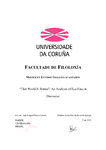Mostrar o rexistro simple do ítem
“This World Is Rotten”: An Analysis of Eco-Fascist Discourse
| dc.contributor.advisor | Puente-Castelo, Luis | |
| dc.contributor.author | Paz Moskowich-Spiegel, Lucía | |
| dc.contributor.other | Universidade da Coruña. Facultade de Filoloxía | es_ES |
| dc.date.accessioned | 2023-11-15T10:01:03Z | |
| dc.date.available | 2023-11-15T10:01:03Z | |
| dc.date.issued | 2023 | |
| dc.identifier.uri | http://hdl.handle.net/2183/34228 | |
| dc.description.abstract | [Abstract] The 20th century saw the birth and replication of a new, dangerous ideology: fascism. Over the past century, it has led to a variety of subtypes, one of which interests us specially: ecofascism. This dissertation explores how the English language is used by ecofascists and spread through the internet through the use of discourse analysis. In the past few decades of the 20th century, discourse analysis appeared and branched into three main approaches. The last of these approaches, that is, Critical Discourse Analysis (CDA), utilises a mixed methodology in which linguistic, textual and social elements are considered. The present study has been carried out by following CDA and, more particularly, Fairclough’s approach to it, which involves looking into different linguistic features through the glass of socio-historical context. Fairclough’s model emphasises the division of the three levels present in CDA: the textual dimension, the discursive dimension and the social dimension. Corpus studies have also been a part of this analysis to aid in the creation of the most objective study possible, by comparing a corpus created with ecofascist texts specifically for this dissertation with two control corpora, the BNC and the COCA. This dissertation shows how, by scrutinising the published material in as much detail as a work of this magnitude and kind allows, the use and repetition of certain terms and other linguistic subtleties has a very real and relevant ideological purpose. To this end, I have focused on elements such as pronouns, modal verbs and rhetorical devices used in a linguistic context. This analysis has proven that my initial hypothesis that linguistic and textual elements are being used for the writers’ own profit, thus influencing the readership, is correct. | es_ES |
| dc.language.iso | eng | es_ES |
| dc.rights | Os titulares dos dereitos de propiedade intelectual autorizan a visualización do contido deste traballo a través de Internet, así como a súa reproducción, gravación en soporte informático ou impresión para o seu uso privado e/ou con fins de estudo e de investigación. En nengún caso se permite o uso lucrativo deste documento. Estos dereitos afectan tanto ó resumo do traballo como o seu contido Los titulares de los derechos de propiedad intelectual autorizan la visualización del contenido de este trabajo a través de Internet, así como su reproducción, grabación en soporte informático o impresión para su uso privado o con fines de investigación. En ningún caso se permite el uso lucrativo de este documento. Estos derechos afectan tanto al resumen del trabajo como a su contenido | es_ES |
| dc.subject | Critical Discourse Analysis (CDA) | es_ES |
| dc.subject | Corpus linguistics | es_ES |
| dc.subject | Ecofascism | es_ES |
| dc.subject | Global North | es_ES |
| dc.subject | Global South | es_ES |
| dc.subject | Discourse | es_ES |
| dc.subject | Racism | es_ES |
| dc.title | “This World Is Rotten”: An Analysis of Eco-Fascist Discourse | es_ES |
| dc.type | info:eu-repo/semantics/masterThesis | es_ES |
| dc.rights.access | info:eu-repo/semantics/openAccess | es_ES |
| dc.description.traballos | Traballo fin de mestrado (UDC.FIL). Estudos ingleses avanzados e as súas aplicacións. Curso 2022/2023 | es_ES |






